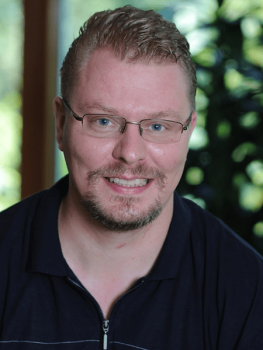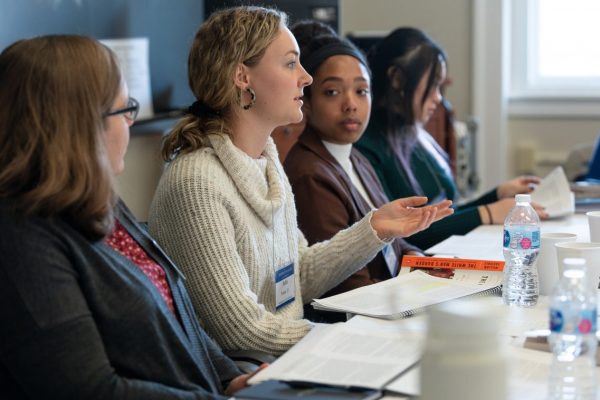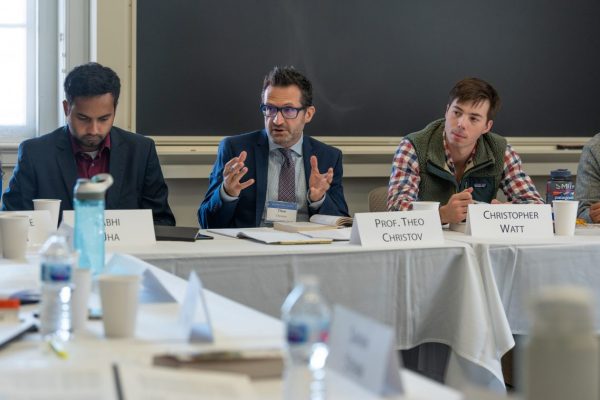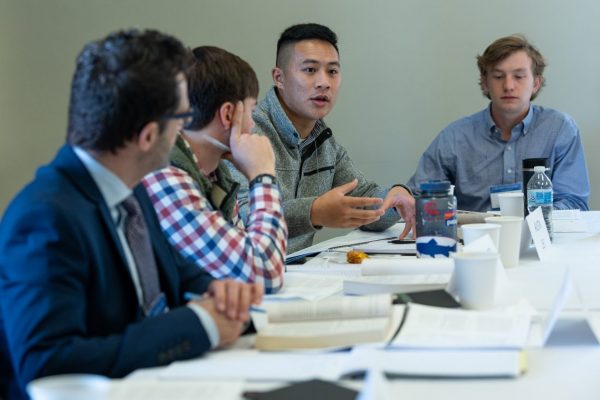
Blunch Hosts “The Economics of Foreign Aid” IHS Colloquium at W&L The Institute for Humane Studies discussion colloquia program facilitates critical thinking and discussion, serving as a great opportunity to explore a topic deeper than can be done in the classroom.
“Having benefited tremendously myself from attending the small, selective IHS Colloquia back when I was a student, first in Denmark and then later in England, this was a great opportunity for me to ‘give back’ to the current generation of students, and to IHS.”
~ Professor Hugo Blunch
On Sat., Nov. 2, Professor of Economics Niels-Hugo Blunch hosted a day-long colloquium on “The Economics of Foreign Aid” in collaboration with the Institute for Human Studies (IHS) at George Mason University. IHS provided generous funding and logistical support to this event.
“Having benefited tremendously myself from attending the small, selective IHS Colloquia back when I was a student myself, first in Denmark and then later in England, this was a great opportunity for me to ‘give back’ to the current generation of students, and to IHS,” said Blunch.
The Institute for Humane Studies discussion colloquia program facilitates critical thinking and discussion, serving as a great opportunity to explore a topic deeper than can be done in the classroom.
Professor Blunch chose “The Economics of Foreign Aid” as the colloquia topic as it relates to his own area of expertise in both his teaching and research. “I could have led the discussions comfortably by myself,” Blunch noted, “But when I had the opportunity to bring in Professor Christov as a discussion leader—who is from my Alma Mater, The George Washington University, no less—I jumped at that opportunity immediately. I saw an opportunity to learn something myself, in terms of seminar leading-style, and more!”
IHS’s typical platform allows students to simply sign up to take part in the small colloquium (18 students in total), but Professor Blunch suggested a different model. He asked students to email him a brief essay discussing foreign aid and explaining their motivation to take part in the colloquium. Blunch then selected students based on their essay responses, keeping a balanced mix between economics majors and others.
His final selection represented the full range of class years, from first-year students to seniors, and there was a waitlist! “I think this helped ensure the best selection of students and therefore also the best environment for students to engage in the discussions at the day of the colloquium,” said Blunch.
Students invited to the colloquium had to read 150 pages of selected readings that were provided prior to the event. They also attended all sessions of the day-long colloquium, including meals and discussion groups. The IHS provided the framework, mailing participants articles and chapters from various books, and a copy of “The White Man’s Burden: Why the West’s Efforts to Aid the Rest Have Done So Much Ill and So Little Good” by William Easterly, a professor at NYU and a critical voice in the debate on foreign aid.
“Professor Christov did an excellent job,” said Blunch, “and we also had an effective back-and-forth, in which I would pitch in with my own observations and questions, and some of my experiences from working at the World Bank over 2 decades.” Since joining W&L, Blunch has continued to work as a consultant for the World Bank on a case-by-case basis. “I could also offer insight from traveling in—and conducting my personal research on–several developing countries across the continents, including Ghana, India, and Brazil,” he said.
“I think the readings were well chosen,” Blunch continued, “as reflected by the rich discussions throughout the day.” They organized the readings around four topical sessions. First a discussion for the different approaches to foreign aid, followed by a discussion of poverty traps and the “Big Push.” A session followed this on “Western Guilt,” while a final one called “Can Foreign Aid Work?” ended the colloquium.
Two members of IHS’s Program Operations team, Sarah Straw, who heads the team and also served as the program director, and Lynanne Lowry, who assisted with all the logistical pieces of the program, were on campus for the duration of the event.
The day finished with a joint dinner at Salerno’s for all participants funded by IHS, where everybody continued the discussions from the day’s program.
Several students approached Professor Blunch after the colloquium to let him know how much they had enjoyed taking part, “So I wonder if I just might do it again, next year!” Blunch exclaimed.
George Mason University’s Institute for Humane Studies supports and partners with professors to promote the teaching and research of classical liberal ideas and to advance higher education’s core purpose of intellectual discovery and human progress.
Student Perspectives
Stephanie Sezen ’21
Major: Economics
Minors: Latin American and Caribbean Studies and Middle East and South Asia Studies
“As someone deeply interested in development economics, when I heard about this colloquium on foreign aid, I was very quick to get involved. The discussion not only gave me a better understanding of what development entailed but also allowed me to engage with academic material outside the classroom with peers that shared the same passion. From approaching development clinically to understanding the contention associated with foreign aid, I thought the Colloquium did a great job with fostering a healthy, multifaceted dialogue between its participants. That the Colloquium was oriented more as a discussion among students rather than a lecture allowed me to contribute my thoughts organically without worrying about my level of expertise on the topic. Once again, I was reminded of just how fascinating the study of economic development is—even on a Saturday morning!”
Katherine Ingram ’20
Majors: Economics and Environmental Studies
“The Colloquium was a unique opportunity to convene with a diverse group of W&L students across disciplines, and I enjoyed hearing everyone’s thoughtful insights on the topic of foreign aid. I hope W&L continues to host these symposia which not only allow us to explore topics in complex detail but expose us to new faces and ideas right here within our own community.”
 Professor of Economics Hugo Blunch
Professor of Economics Hugo Blunch Students participated in a discussion on “The Economics of Foreign Aid.”
Students participated in a discussion on “The Economics of Foreign Aid.” Facilitating discussion was professor Theodore Christov, Associate Professor of Honors, History, and International Affairs at The George Washington University.
Facilitating discussion was professor Theodore Christov, Associate Professor of Honors, History, and International Affairs at The George Washington University. Austin Lee ’21
Austin Lee ’21
You must be logged in to post a comment.